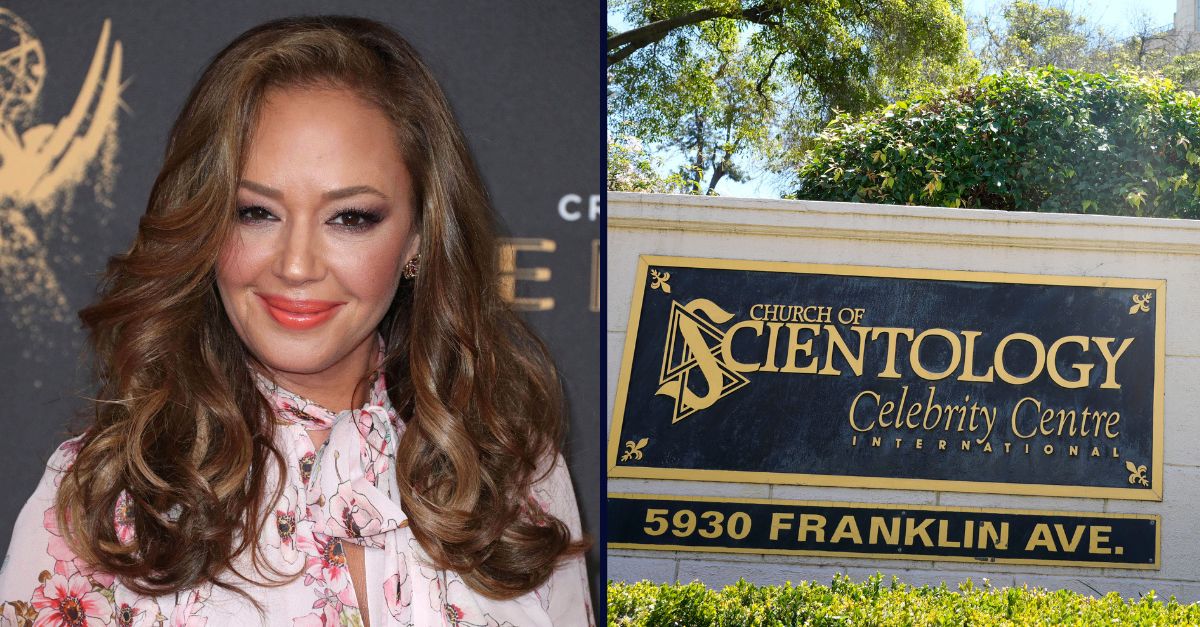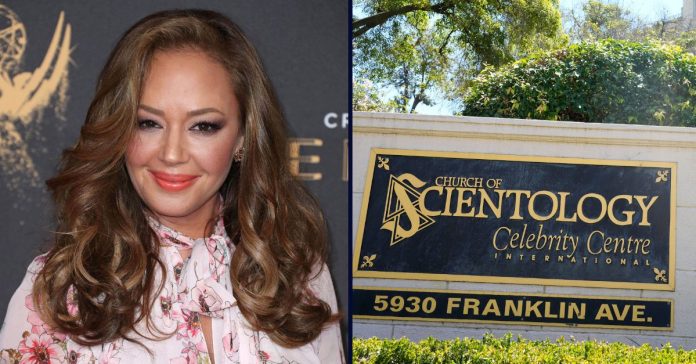
Left: Actress Leah Remini at the 2017 Primetime Creative Arts Emmy Awards held on September 9, 2017 in Los Angeles, California (File Photo by: zz/RE/Westcom/STAR MAX/IPx 2017 9/9/17. Right: The Church of Scientology Celebrity Centre is pictured, Friday, April 21, 2023, in Los Angeles. (AP Photo/Chris Pizzello).
A Los Angeles judge was apparently convinced to throw out most of Leah Remini’s defamation claims against the Church of Scientology, but is still planning to allow other portions of the actor’s case to go forward.
The 53-year-old star of “The King of Queens” has been locked in a highly public battle with the Church of Scientology over Remini’s public criticism of the organization. Remini has said she was forced into joining the church as a child, but left in 2013 before becoming an outspoken critic. In 2015 she published a memoir titled, “Troublemaker: Surviving Hollywood and Scientology,” and participated in the hit docuseries, “Scientology and the Aftermath.”
Remini sued the church and its leader David Miscavige in 2023, claiming that in response to her public criticism, they waged “a campaign to ruin and destroy her livelihood.” That effort she said, included harassment, stalking, intentional infliction of emotional distress, tortious interference with contract, intentional interference with prospective economic advantage, defamation, and false light.
The Church of Scientology moved to dismiss the lawsuit under California’s anti-SLAPP statute. Anti-SLAPP laws, so named for “strategic lawsuits against public participation,” allow a defamation defendant grounds to dismiss a complaint in a lawsuit’s early stages if it is proven that the suit was filed in an effort to chill free speech.
In its anti-SLAPP motion, the church argued that it had a legal right to fight back against Remini’s public criticisms, and that all it was doing was “shin[ing] a light on [Remini’s] ugliness” and letting her supporters known they were “giving comfort to an anti-religious bigot.” The church said that for its part, it “always told the truth,” and that Remini’s “hate and bigotry is documented.”
In an exhaustive 42-page tentative ruling, Los Angeles County Superior Court Judge Randolph Hammock wrote that he was inclined to dismiss most of Remini’s defamation claims, but planned to leave counts of harassment and economic interference in place. The tentative ruling is not the judge’s final decision, as the hearing is still ongoing.
In the tentative ruling, the court considered the church’s anti-SLAPP defense and concluded that both the church and Remini are high-profile public entities that have engaged in a public battle about an issue of significant public interest. The document noted that the public discourse not only involved high-profile parties, but that it also concerns religion — a fundamental right under the Constitution.
Hammock’s reasons for dismissing Remini’s defamation claims varied. Some claims, such as one that the church filed a false police report against Remini and an article accusing her of extortion, were time-barred by the one-year statute of limitations. Other claims would fail on the grounds that they were not statements of fact, but rather, statements of mere opinion — such as an article titled “Are Leah Remini and A&E responsible for the Wave of Violence Against the Jehovah’s Witnesses’ Kingdom Halls?” and another that suggested Remini “might have ‘inspire[d] praise of Hitler.””
The court did not indicate that it would dismiss all of Remini’s defamation claims though. For example, the court found that claims based on statements that Remini had been abusive to her mother and daughter or had ransacked her dying grandmother’s apartment could amount to defamation. Hammock rejected the Church of Scientology’s argument that it had no duty to fact-check allegations made by Remini’s family members and said that Remini had already shown enough evidence that the church acted with “at least a reckless disregard of the facts” — the legal standard necessary to defame a public figure.
The judge said he would likely deny the church’s motion to dismiss Remini’s harassment claims. The Church of Scientology argued that any surveillance conducted on Remini was nothing more than pre-litigation preparation conducted by its legal team. Hammock flatly rejected this argument, writing that it was “unsupported by the evidence, and contradicts common sense.” The judge added that he sees no public interest in surveilling public citizens, even celebrities, simply based on some vague suspicion of later litigation.
Hammock also said he would allow some of Remini’s economic claims related to the church’s interference with her business relationships to continue.
You can read the tentative ruling here.
Have a tip we should know? [email protected]

